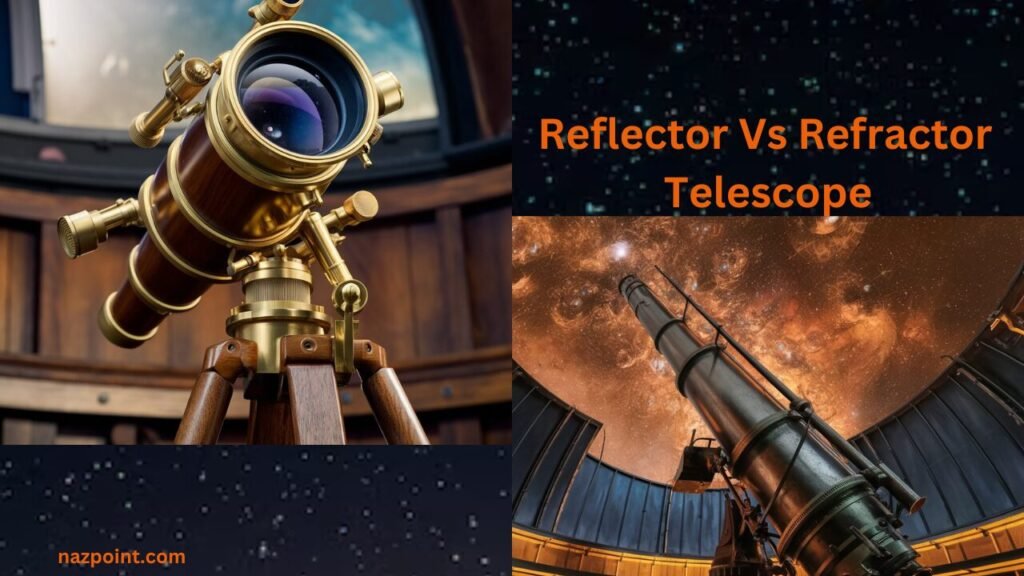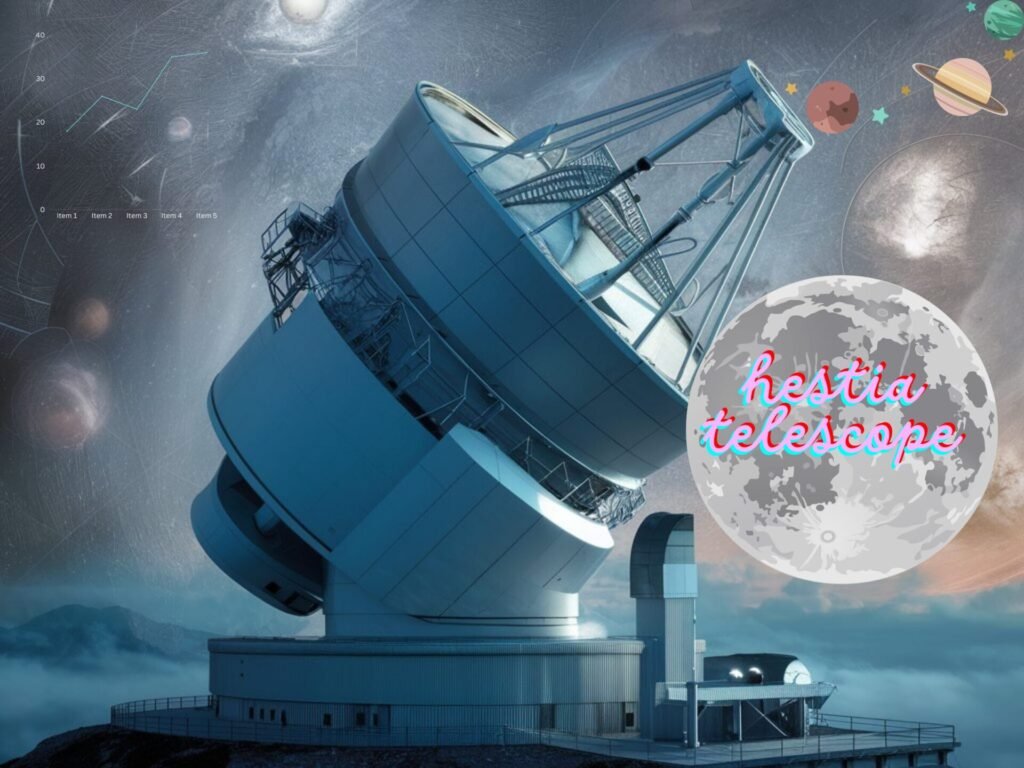Well, this is a common question being asked as to what is better when the comparison is reflector vs refractor telescope. Also, is a reflector better or a refractor? for astrophotography?
Let’s go into depth and analyze several important factors. For kids, our guide best telescope for kids, will assist you.
Reflector vs Refractor Telescope
In order to know what is best: Reflector Vs Refractor Telescope-The Better Choice?, let’s first learn about the main features of each of these and what exactly is the difference between the two. Obviously, when you intend to buy a new telescope from the market, you get a little confused between a reflector vs refractor telescope. You might get influenced by reflector telescopes since they are more popular due to their unique capability of certain wavelengths or you may get attracted to a refractor telescope too since it utilizes some special lenses for better vision.
Anyhow, in this blog, we will cover all the possible dimensions and try to help you get clearer with better choices. Which one is better? What factors are to be kept in view when determining what you want to see? What are wise and accurate choices?
Reflector telescope
The other simple name for Reflecting telescopes is reflectors. They were invented by Isaac Newton and brought havoc in the world of technology. Their functionality is simple as they utilize mirrors to capture light. They were brought into public in the 17th century and presented a solution to a problem – chromatic aberration.
What is chromatic aberration?
It is a state of fuzzy image with colored halos. Usually, it happens when different wavelengths of light bend when they pass through the lens.
Principles of Reflector Telescope
The two mirrors of the reflector telescope are mainly responsible for its functionality. The primary mirror is a large curved mirror at the bottom of the telescope tube which gathers light from the object and reflects it upwards while on the contrary, the secondary mirror then redirects the light to an eyepiece located at the top of the tube. This is how the magnified image is created just like hestia telescope and then the handler can actually view it clearly.
Pros and cons of a reflector telescope
| Pros | Cons |
| Offers exceedingly larger diameters | Its design is bulkier and a little difficult to carry |
| produces large reflectors with giant lenses at cheaper prices | sometimes there are imperfections in the image quality that it produces |
| approximately 10-12 meters in diameter | Collimation is more often needed (a process of aligning the mirrors) |
| infrared and ultraviolet included which are suitable for better wavelengths of light | regular cleaning of the primary mirror and other parts is very much needed |
| study multiple galaxies, stars and planets | If the telescope is moved when you intend to track any object, an image shift issue is more likely to be faced |
Optical quality of Reflector Telescope
The optical quality of the Reflector telescope is amazing. It boasts sharp views avoiding chromatic aberration. The image quality is smoother, crispier and brighter and develops higher contrast views of far sky objects.
Practice of Reflector Telescope
- Familiarize yourself with the reflector telescope during the day by aligning the finder scope and adjusting the mount.
- Identify constellations and bright stars, star charts and astronomy apps so that you stay informed
- Begin with locating bright objects that are easier to find like the Moon, Venus, or Jupiter
- Look for a sharp, high-contrast image – details
- Check Collimation to better know about this process.
- Enjoy your cosmic discoveries
Considerations About Reflector Telescopes
As described earlier, be considerate about the bulkier size, image shift, mirror alignment and handling of bulkier designs. On a larger picture, your experience, on the other hand, will be amazing and the sky will be your ultimate limit.
Reflector vs refractor telescope is still a question? Well, it is answered in this article at length. Let’s continue

Refractor telescopes
The other simple name for Refracting telescopes is refractors. They were invented by Isaac Newton and contributed well in the dynamic era of technology. Refractors are considered to be the gateway for exploring the wonders of the cosmos as they were the first telescopes with this functionality. They simply utilize mirrors to capture light and easily became popular due to simple design and ease of use for all interested astronomers.
Principles of Refractor Telescope
The key components of a refractor telescope are the objective lens and a large curved lens. This lens gathers light from the object and bends it to a focal point. Refractors also use a second lens to magnify the image for viewing.
Pros and cons of refractor telescope
| Pros | Cons |
| produces sharp, clearer and better-quality images | When the diameter increases, the cost also increases |
| No issue of chromatic aberration like colored halos around objects | Not very budget friendly as large refractors are expensive |
| delivers a clear and true representation of observed objects | Limited light-gathering capacity |
| compact and lightweight | Has less range of wavelengths |
| perfect for good observing practices | Is not ideal for studying the full spectrum |
Optical quality of Refractor telescope
Refractors are known for their exceptional optical quality. Their lens design minimizes chromatic aberration, delivering crisp, high-contrast views free from colored halos. However, image sharpness depends on the quality of the lenses used. Higher-grade achromatic or apochromatic refractors offer the best resolution and detail but come at a premium price.
Practice of Refractor telescope
- Try to find the right magnification so that your target and field of view are super convenient.
- Master the controls with easy targets like the Moon or Mars.
- Practice and focus with the finder scope.
- Achieve a sharp, high-contrast image so that features are good to watch.
- Patience is the ultimate key if you wish to explore the wonders of the cosmos.
- Enjoy your astronomical journey.
Considerations About Refractor Telescopes
Refractors have extremely charming lenses that deliver stunning views and larger apertures. They are perfect for planets and the Moon with user-friendly window. Refractors are better choice when you keep Reflector Vs Refractor Telescope in view.
Best refractor telescope
The Astro-Tech Equinox ED refractor telescopes have been a wise selection for multiple reasons like their image quality, durability, well portability, and better convenience. It also depends on your budget and how unique or great refractor you are looking for. However, if you are a beginner, Equinox ED refractors , 80mm model is a wise choice as it offers sharp views of the space items.
Reflector vs refractor difference
Quality of image:
Well-designed refractors offer sharper views because they don’t have the disturbance of a secondary mirror in their layout.
Bending of light:
As mentioned above in the article, reflectors use mirrors to reflect the light while refractors use lenses to bend it further.
Maintenance of telescopes:
Reflectors come across collimation to acquire better image quality; however, refractors are not set at this particular setup.
Chromatic Aberration:
Reflectors don’t suffer from chromatic aberration, but refractors generally have this issue due to light bending processes of different wavelengths.
Pricing factor:
Reflectors are way cheaper than refractors.
Physical appearance:
Reflectors are known for huge size and weight while refractors tend to be more convenient at handling, especially when travelling.

Reflector vs refractor telescope beginner
Although both can show planets, stars, moon etc, however, reflectors are great for deep sky but need some mirror adjustment while refractors are ideal for faint objects because they are more compact, affordable and easy to use.
Reflector vs refractor telescope for astrophotography
Astrophotography! What an amazing adventure. If you need some faint light, for galaxies, you must go for Reflectors. They are the best for deep sky astrophotography. They will provide larger apertures provided mirror alignment is done at its best. On the contrary, if you wish to view wide sky objects with better pricing, go for a refractor then.
Catadioptric telescope vs Reflector vs refractor
Reflector vs refractor telescope is already much discussed however let’s check the details of Catadioptric telescope:
Catadioptric is an all in all telescope for planets and deep sky. It combines lenses and mirrors to present the effect of sharper views with less complexity than reflectors.
Refractor vs Reflector telescope cloudy nights
| Refractors | Reflectors |
| sharp views | affordability |
| ease of use | ability to see fainter deep sky objects |
| quick observing sessions | involve collimation tips |
FAQ
What is a better telescope, refractor or reflector?
Refractors are better telescopes as their cost of maintenance is not that high. They are realistically good for beginners.
What are the Advantages of refracting telescopes?
Refracting telescopes are easier to use and are designed with fewer issues of image shift. They provide sharp and clear images reducing maintenance expense. If you talk about lenses, they are secure and durable, especially for beginners.
Why are Reflecting telescopes better than refracting?
Reflecting telescopes are better than refracting telescopes because they have a shorter length and do not suffer from chromatic. They prevent sagging making reflecting telescopes ideal for all the enthusiastic observers.
Are reflector telescopes good for viewing planets?
Yes, reflector telescopes are good for viewing planets because they have shorter focal lengths to locate and track planets. They are affordable and versatile for professional planetary observers.
Why are most professional telescopes reflectors, not refractors?
Most professional telescopes are reflectors due to the fact they are built larger and allow for better light resolution which is extremely important for faint objects.
Do professional astronomers use reflecting or refracting telescopes?
Professional astronomers use reflecting telescopes because they allow for greater and better resolution. They are ideal for advanced astronomical research.
Reflector Vs Refractor Telescope-The Better Choice? Now the answer rests with you….



